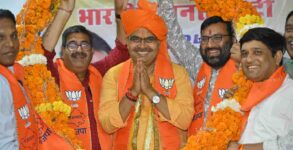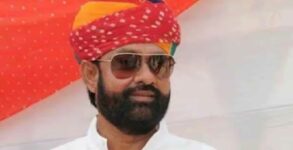Jaipur: Free speech is facing a threat in India sprouting from “religious motivations, political biases and social judgments” and this reflects “apathy” on the part of the state, Juergen Boos, the President and CEO of the Frankfurt Book Fair, observed on Wednesday.
“Attempts in the recent past to silence journalists, writers, filmmakers and publishers reflect the rise of identity politics and apathy on the part of the state. Two journalists of international repute – Gauri Lankesh and Shujaat Bukhari – were shot dead within a span of nine months. Publisher friends like DC Books, Kalachuvadu Publications and their authors have witnessed attacks by fanatics who may have never even read the books in question,” Boos, who trained as a publisher at Herder Verlag in the early 1980s, said in his inaugural address at the Jaipur BookMark.
The Jaipur BookMark is the South Asian publishing conclave that runs parallel to Jaipur Literature Festival (JLF), and kicked off on Wednesday.
Addressing a packed house of publishing insiders at the Durbar Hall of the Diggi Palace here, Boos said when he looks at the “hysteria, hatred and hostility that characterise the discussion in social media, the permanent state of turmoil that societies around the world find themselves in”, he begins to doubt whether we are actually capable of using the communications technologies whose development we are so proud of.
Boos, a recipient of the prestigious Australian Cross of Honour for Science and Art, contended that free exchange of ideas and opinions has never been easier than in the 21st century.
“And never has it been so threatened.”
He reflected that everyone today is in a position to publish whatever they want – using blogs, podcasts and self-publishing platforms, as well as traditional publishing houses.
He prescribed that the present state of affairs demands the publishing industry “take a stance”.
“Expressing an opinion of this type was long reserved for politicians or the media. Today, in the 21st century, we all have the possibility of making our voices heard. And we should not do that in keeping with the motto ‘overnewsed but uninformed’ but in a carefully considered manner.
He also asked how publishing houses and their products can remain relevant in an age in which fake news can be disseminated faster than well-researched books.
Boos, who is also a member of the German Book Prize Academy, further said that publishers in the 21st century are in a privileged position: the industry looks back on a long tradition, on the one hand, and has built a reputation.
“Publishers are gatekeepers – they filter and assess content, they curate before they publish. They consider it part of their job to publish content that is well-researched, documented, checked and carefully assembled as way of contributing to the range of opinions present in society. Publishers and authors in many parts of the world risk their lives by writing or bringing out books that criticise regimes, uncover injustices and shed light on political failures,” he contended.
-IANS


















